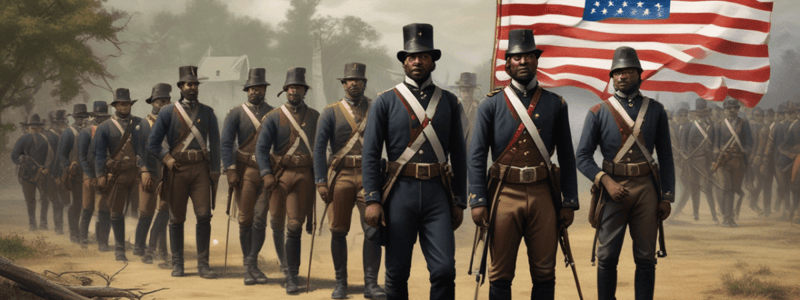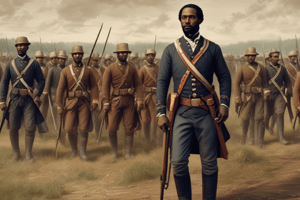Podcast
Questions and Answers
What was the primary cause of Bleeding Kansas?
What was the primary cause of Bleeding Kansas?
- The westward expansion of the United States
- The abolition of slavery in the Northern states
- The ratification of new states
- The growing contention regarding slavery (correct)
What was the main difference between the Northern and Southern states regarding slavery?
What was the main difference between the Northern and Southern states regarding slavery?
- The Northern states were economically dependent on slavery, while the Southern states were not
- The Northern states were politically oriented towards the abolition of slavery, while the Southern states were not (correct)
- The Northern states had a larger population of plantation owners, while the Southern states did not
- The Northern states allowed slavery, while the Southern states did not
Why did pro-slavery and anti-slavery advocates send settlers to Kansas?
Why did pro-slavery and anti-slavery advocates send settlers to Kansas?
- To start a new war
- To dominate the territory and influence its political future (correct)
- To create a new government in the region
- To create a new economy in the region
What is the significance of Bleeding Kansas, according to many scholars?
What is the significance of Bleeding Kansas, according to many scholars?
What was the outcome of the conflict between pro-slavery and anti-slavery advocates in Kansas?
What was the outcome of the conflict between pro-slavery and anti-slavery advocates in Kansas?
What was the name of the event where John Brown captured and executed five pro-slavery settlers?
What was the name of the event where John Brown captured and executed five pro-slavery settlers?
Who was the territorial governor who brokered a fragile peace in Kansas, ending the larger conflict?
Who was the territorial governor who brokered a fragile peace in Kansas, ending the larger conflict?
What was the significance of Bleeding Kansas?
What was the significance of Bleeding Kansas?
What was the outcome of John Brown's raid on Harper's Ferry?
What was the outcome of John Brown's raid on Harper's Ferry?
When did Kansas become a state?
When did Kansas become a state?
What was the main concern of politicians on both sides of the slavery debate during the expansion of the U.S. westward?
What was the main concern of politicians on both sides of the slavery debate during the expansion of the U.S. westward?
What was the provision of the Compromise of 1850 that allowed certain territories to decide on the issue of slavery?
What was the provision of the Compromise of 1850 that allowed certain territories to decide on the issue of slavery?
What was the outcome of the Kansas-Nebraska Act, besides the organization of the newly acquired territories?
What was the outcome of the Kansas-Nebraska Act, besides the organization of the newly acquired territories?
What was the name of the company that sent settlers from the east coast to influence the future of Kansas as a free state?
What was the name of the company that sent settlers from the east coast to influence the future of Kansas as a free state?
What event in 1855 marked the initial outbreak of violence in Kansas?
What event in 1855 marked the initial outbreak of violence in Kansas?
Flashcards are hidden until you start studying
Study Notes
Bleeding Kansas
- A period of civil unrest and violence in the 1850s in what is now the state of Kansas
- Characterized by sectarian violence between pro-slavery and anti-slavery advocates vying for political control in the newly forming state
Causes of Bleeding Kansas
- Growing contention regarding slavery, amplified by the westward expansion of the United States
- Northern states were politically oriented toward the abolition of slavery, while Southern states' economies largely depended on the slave system
- The ratification of new states became a volatile issue, with the South wanting new states to allow slavery and the North wanting slavery prohibited
The Kansas-Nebraska Act
- Passed in 1854, it set up the organization of the remaining land acquired through the Louisiana purchase
- Included the popular sovereignty provision, allowing states formed in the newly organized territory to decide for themselves on the issue of slavery
- Resulted in a land rush, with settlers from both sides of the slavery debate migrating to Kansas to influence its political demographics
Violence in Kansas
- Started in November 1855, with a standoff between opposing militias near the Wakarusa River
- Escalated in 1856, with scattered attacks from both sides, including the infamous "Border Ruffians" from Missouri
- The Sacking of Lawrence, Kansas, and the Pottawatomie Massacre were notable events
- The violence culminated in August 1856 with the Battle of Osawatomie
Significance of Bleeding Kansas
- A harbinger of the U.S. Civil War, reflecting the growing tensions regarding slavery that were coming to a boil throughout the United States
- Showed that the debate over slavery could also turn violent at the national level
- Bleeding Kansas signaled to both sides that the issue could never be truly resolved cooperatively—or perhaps even peacefully
Aftermath
- Kansas became a free state in January 1861, with anti-slavery sentiment gaining the popular majority
- The election of Abraham Lincoln to the presidency in November 1860 was the final straw for many Southern states, leading to their secession from the U.S.
Studying That Suits You
Use AI to generate personalized quizzes and flashcards to suit your learning preferences.




